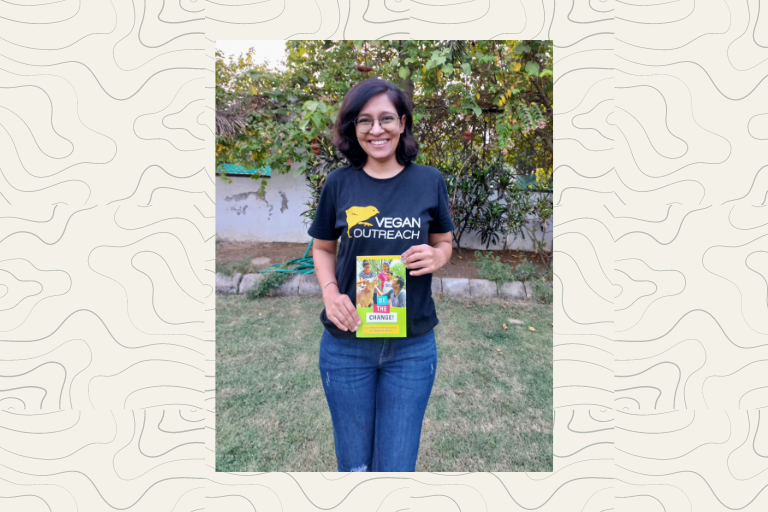
Partner Spotlight | Vegan Outreach
Richa Mehta
Director of Programs, Asia-Pacific | Vegan Outreach
Interviewed By: Nidhi Gupta
Nidhi: Before we begin, let’s go back and recall that moment or a memory when you learnt that animals deserve kindness and respect, that they feel pain. We believe that journey is your inspiration today.
Richa: My father taught me to be kind to animals. He always took care of the dogs living around our home. I vividly remember rescuing a pig when I was seven years old after it fell into an open manhole. Although it bit me during the process, I was happy that I could help it. However, I didn’t realise how my food habits affected animals until I learned about ‘speciesism’.
In 2014-15, I investigated dairies in Rajasthan and witnessed the cruel side of the industry. I saw the atrocities that animals face on dairy farms. There was one dairy farm where 20 buffaloes were crammed into a small windowless room. It was horrible and painful. I could feel the ammonia burning my eyes. No one deserves to live like that. That sight changed my life. The best part of being vegan is to know that I am not responsible for such cruelty. However, looking back, I realise that if I had known about veganism and speciesism earlier, I could have done more to help animals.
For a long time, I contributed to animal cruelty even unknowingly is something that always bothers me. That’s why I find working at Vegan Outreach inspiring. We provide knowledge and information to students who may not have had the opportunity to learn about veganism and speciesism earlier in life. I meet many students who are compassionate and kind towards animals but lack the information they need to make a difference. Our programs give them a chance to learn about how they can help animals by going vegan and why veganism is essential.
More than 80% of the students who attend our webinars express a desire to try veganism for the sake of animals and the environment. Vegan Outreach India helps over 40,000 students try veganism each year, and being a part of such a movement has been an inspiration to me.
Nidhi: I am intrigued to learn more! Can you share some significant experiences or challenges that have shaped your role at Vegan Outreach? Considering our vast landscape, how does Vegan Outreach address these challenges?
Richa: At Vegan Outreach, I learned the importance of creating impact with highly effective campaign tactics. For example, we curate tailored 10W series for each country so that people can have country-specific information in their language with nutrition and traditional vegan dishes information. These seem like small things but it is critical for someone trying to go vegan. We understand that transitioning to a vegan diet can be difficult, especially when you do not have the right support and information. None of us are born vegan. Factors like religion, culture, habits, beliefs, and geography can play a crucial role in diet change. And our outreach programs help students with the right information and resources to make the change.
In India, the vegan advocacy movement is still relatively new, and vegan advocates need to communicate about veganism with the audience in the most acceptable way. We offer our webinars in regional languages and offer our 10 Weeks to Vegan email series in Hindi and English, including various other resources. We also have the 10 Weeks to Vegan series for vegetarians and non-vegetarians. We learned that India is a diverse country and we need to address the challenges faced by new vegans in India.
I participated in online and in-person outreach, including webinars, seminars, leafleting, and virtual reality outreach activities. In all these years, I learned that the majority of students want to help animals and are ready to make changes for the environment but don’t know how. By providing the right information and support, we can create more vegans. In our Food Planet Health Awareness Session program, we help students see the impact of animal agriculture on animals, health, and the environment.
Nidhi: With our youth being the hope of the future, how is Vegan Outreach sparking conversations with the younger generation about the benefits of a plant-based diet? Can you elaborate on some initiatives and its effectiveness?
Richa: Students are driven, inspired, and flexible. They can make their own decisions and with the right information, they can make positive changes – most of them want to do. We reach out to students who are already interested in social causes and want to bring change.
At Vegan Outreach we have always tried to create an impact with highly efficient strategies. Initially, we used to do in-person outreach through leafleting and organising virtual reality outreach in colleges. In 2019, we refocused our college outreach from handing out booklets to signing people up for our program, 10 Weeks to Vegan through seminars and interactive Virtual Reality outreach activities. During the Covid-19 pandemic, we continued our impact through webinars and started reaching out to more students. Post-pandemic, considering the greater impact, time efficiency, and cost-effectiveness of the online outreach, we launched the Food Planet Health Awareness Session program at full capacity.
In 2021, the first year of its launch, we inspired more than 25,000 students to try vegan. Soon after that with the support of India Animal Fund, we collaborated with the Ministry of Youth Affairs and started organising nationwide webinars. At present, more than 40,000 students sign up for our 10 Weeks to Vegan program after attending the webinars and more than 1000 colleges participate in the program annually.
We organise nationwide webinars with the National Service Scheme centres in the universities. Our webinars focus on the impact of animal agriculture on animals, health, and the environment. We start the dialogue by discussing region-specific issues and causes to which students can relate. Our thought-provoking presentation, followed by an interactive discussion session, allows students to share their reactions and ask important questions. Interaction in regional languages creates a deeper impact and provides a space for everyone to participate in the dialogue. We also invite teachers to participate in these sessions and that creates an impact at the institutional level. Our presentation has interactive content and audio-visual elements that keep students engaged. And most importantly, our outreach coordinators who present these webinars are amazing. I have never seen people so inspiring and dedicated to a cause. I am lucky to have such a great team.
Nidhi: I’m sure the students must love such engaging and thought-provoking sessions. What has been the impact so far on students and educational institutions? Can you share some success stories or feedback that your team received during these sessions?
Richa: With each interaction, you create a lasting impact. With webinars, we do create an impact beyond that one-hour session. It impacts students, teachers, their family members, and the wider community. We often receive emails from students and teachers about how the webinar helped them understand the reality of animal agriculture.
Students often say that they didn’t know about the impact of their food habits on animals and the environment. We have teachers, principals, and registrars who became vegan after attending our webinars. Many universities like Reva University and D.Y. Patil University implemented plant-based food policies to reduce their institution’s animal product consumption. Here are some testimonials and pictures of webinars.
Some testimonials:
How cows are exploited in the dairy industry is sad. The shocking fact is that we send them to slaughterhouses when they no longer give milk. We also send male calves to slaughterhouses and kill male chickens in the egg industry because they are not useful. Going vegan is essential in this situation. –Sakshith, a Student from Milagres College, Kallianpur, after attending our Adopt a College Webinar.
I never thought of speciesism before attending this webinar. All life on earth has equal rights to live. Sadly, we feel we are superior. Thank you so much for bringing awareness and giving me a new perspective. ! –Suman Sindhu, a Student from FC College for Women, Hisar, after attending our Adopt a College Webinar.
The most shocking thing I learned during the webinar was about the carbon footprint of meat and dairy. It is so huge, and we can reduce it by switching to plant-based food. I like how the speaker shared her personal experiences about her vegan journey. –Soumya Goutam, a Student from Atma Ram Sanatan Dharma College, Delhi, after attending our Adopt a College Webinar.
In school, we are made to read and write that cows give us milk. After the webinar, I realised that they don’t. We take the milk from them—the milk produced by the mother cows for their calves—and we steal it. It’s heartbreaking. –Shaurya A, a Student from Jawaharlal Nehru University, after attending our Adopt a College Webinar.
Nidhi: With the goal of inspiring 50,000 students to kickstart their vegan journey in 2024, what strategies or approaches do you plan to implement to achieve this milestone?
Richa: This year we are aiming to inspire 50,000 students to sign up for the 10 Weeks to Vegan program. It means we will reach out to more than 1500 colleges and universities to participate in 300+ webinars. We are also going to focus more on hybrid webinars since they allow students to participate more actively. We have been working in 14 states and this year we will be expanding our program to four more states (West Bengal, Orissa, Telangana, and Rajasthan) of India.
Our goal is not only to inspire students to try the challenge but also to provide regular support to complete the transition. We offer 10 Weeks communities on Facebook, Instagram, and WhatsApp so that these students can interact with vegan mentors, and group experts and access resources that will help them go vegan and stay vegan.
Our dedicated 10 Weeks to Vegan website is a one-stop platform that provides all important information like nutrition tips, recipes, beginner’s guide, and blogs on various topics including communicating with friends and family about the decision to go vegan, etc. As we inspire more students to go vegan, we are determined to make the transition to a vegan diet as easy as possible.

